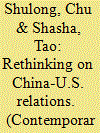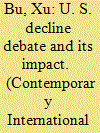|
|
|
Sort Order |
|
|
|
Items / Page
|
|
|
|
|
|
|
| Srl | Item |
| 1 |
ID:
136333


|
|
|
|
|
| Summary/Abstract |
The idea of pacifism dates back to the comprehensive social reforms that were introduced after Japan’s surrender in World War II. The U.S.-led occupying forces carried out a series of democratization and demilitarization policies in a bid to establish a government that would respect other countries and embrace the UN Charter. The U.S. wanted a Japan that would no longer pose a threat to them and to international peace and security. Those policies soon led to a breakdown of Japan’s old systems. In contrast to militarism during the pre-war period, Japan’s U.S.-led social reforms were peaceful. With the gradual evolution of policy adjustments, Japan gradually achieved rapid economic growth and regained recognition from the international community. It apologized for its war-time aggression. Pacifism was widely accepted by the Japanese people and it laid a foundation for Japan’s peaceful development. And so pacifism became part of the Japanese society’s system of values.
|
|
|
|
|
|
|
|
|
|
|
|
|
|
|
|
| 2 |
ID:
136328


|
|
|
|
|
| Summary/Abstract |
The Asia-Pacific region has evolved in to a main battlefield of international strategic rivalry. Tensions are escalating in China’s surrounding areas. China should strike a dynamics balance between defending its legitimate rights and ensuring regional stability by seizing the strategic initiative in managing crises and conflicts on the basis of stabilizing foreign relations and pressing on with international cooperation.
|
|
|
|
|
|
|
|
|
|
|
|
|
|
|
|
| 3 |
ID:
136334


|
|
|
|
|
| Summary/Abstract |
When the German Grand Coalition formed by the two major parties of the Bundestag came to power in December 2013, the new government discontinued its constrained foreign policy profile and, by sending out signals of adjustment, expressed its“big power ambition.”The reality of German proactivity became obvious to the international community during the Ukraine crisis and the U.S. hacking incident. Although factors from German history will slow the full implementation of this policy in the near future, the country cannot but succeed in developing its position among big powers.
|
|
|
|
|
|
|
|
|
|
|
|
|
|
|
|
| 4 |
ID:
136327


|
|
|
|
|
| Summary/Abstract |
Our planet is witnessing the onset of a new stage in globalization, multipolarity and IT application. As a result of this, a fresh reshuffle is underway, coupled with the shifting sands of geo-politics and geo-economics. This has led to major challenges in the established international system and world order.1 The same is also true for the regional picture. Indeed, the turmoil in Ukraine, the unrelenting crisis in the Middle East, and the vortex in the Asia-Pacific, have led to unusual activity in the three blocks of Europe, the Middle East and the Pacific. Under the disguise of an apparent absence of interconnectivity, in-depth interactions are actually at work between them on the question of the future peace and stability of the international community as a whole.
|
|
|
|
|
|
|
|
|
|
|
|
|
|
|
|
| 5 |
ID:
136332


|
|
|
|
|
| Summary/Abstract |
In the quarter-century since the fall of the Berlin Wall in 1989, the former Soviet Union’s disintegration in 1991 and the end of the Cold War, China-U.S. relations have supported the trend of development. The two countries extensively and intensively have engaged in dialogue, close personnel exchanges, unprecedented economic and TRADE relations, and bilateral coordination on international and regional issues. The bilateral relationship has profound influence over the two countries and the world but, while total confrontation and crisis is not on the horizon, there is no guarantee that their future disagreements will not become serious or intractable. In this past quarter-century, the U.S. has repeatedly used and threatened to use force against China, a sign that military conflict between them, even a local or relatively large-scale war, is not out of the question. The U.S. global strategy has not changed, the basic content and goals of the U.S. strategy towards China have not changed, and the nature of the China-U.S. relationship is yet to be defined.
|
|
|
|
|
|
|
|
|
|
|
|
|
|
|
|
| 6 |
ID:
136329


|
|
|
|
|
| Summary/Abstract |
The emergence of well-positioned middle powers is a profound impetus for change within the international arena of structure rearrangement, issues replacement, and values reconstruction. In particular, India, Brazil, Turkey and South Africa are middle powers that rose together during the global FINANCIAL crisis to become a compelling force, each transitioning to active participant rather than follower.1 As a result, Chinese diplomatic personnel are in a unique position to capitalize on their newly transformed political and economic influence.
|
|
|
|
|
|
|
|
|
|
|
|
|
|
|
|
| 7 |
ID:
136330


|
|
|
|
|
| Summary/Abstract |
In recent months, the Philippines has frequently stirred up trouble on Huangyan Island and the Ren’ai Reef. On March 30, 2014, it submitted a petition to the international tribunal. Even on the eve of submitting its complaint, the Philippines sent several so-called “civilian ships” to forcefully enter the waters around the Ren’ai Reef, and arranged for a number of reporters from various television stations and other media to witness the journey and stir up public opinion. The Ren’ai Reef has also been included within the line of the sovereign territory scope to which it lays claim. The U.S. has also made irresponsible comments on the Ren’ai Reef issue in order to sign the U.S.-Philippine Enhanced Defense Cooperation Agreement that will give the U.S. forces access to Philippine military bases. On March 31, the U.S. State Department’s deputy spokesman Marie Harf claimed that China had tried to block Philippine access to its supply ship stranded on the Ren’ai Reef, leading to a standoff between the two sides for nearly two hours. The U.S. considered that this was provocative behavior that would lead to instability. No doubt, such comments do not represent the full facts, and will encourage the Philippines to make further provocations and to heat up the South China Sea disputes.
|
|
|
|
|
|
|
|
|
|
|
|
|
|
|
|
| 8 |
ID:
136331


|
|
|
|
|
| Summary/Abstract |
The possibility that the U.S. is in decline has renewed concerns over the international strategic situation and the global order. The World Bank’s International Comparison Program (ICP) released data in April 2014 that suggested China’s economy could overtake that of the U.S. as soon as the end of this year (based on purchasing power parity or PPP which takes into account the relative costs of goods and services and inflation rates). Their figures showed that the size of China’s economy was 87% of the U.S.’in 2011—that is 15% bigger than previously estimated. China’s economy is thought to have grown roughly 24% since 2011, while the U.S. economy is expected to have grown less than 8% .2 The possibility that the U.S. economy is in decline has worried both the public and scholars, and has sparked a new round of lively debate on the future of the international strategic situation
|
|
|
|
|
|
|
|
|
|
|
|
|
|
|
|
|
|
|
|
|